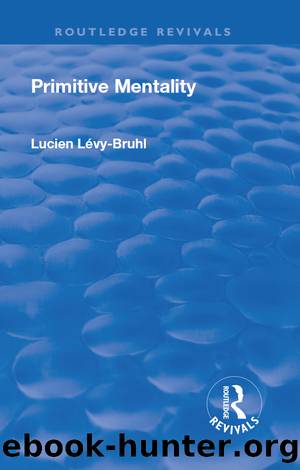Revival: Primitive Mentality (1923) by Lucien Levy-Bruhl

Author:Lucien Levy-Bruhl
Language: eng
Format: epub
ISBN: 9781351346979
Publisher: Taylor & Francis (CAM)
IV
From the facts collected here it is permissible to conclude that the ordeal by poison, practised in the trials for witchcraft which are so common among many African peoples, is a mystic process, similar to divination, the object of which is to discover the wizard, kill him, and at the same time destroy the witchcraft which imbues him. It has therefore nothing in common with a “judgment of God.” Meinhof draws attention to this point. “Nowhere, as far as I know, does the African refer the result of the ordeal directly to God; he attributes it to the magic powers of the charm employed, to which the guilty succumbs while the innocent escapes scot free.” And in a note he adds: “The ordeal, like everything else, is undoubtedly the outcome of a Divine gift; but it acts of itself in an independent (selbstständig) fashion, like a‘medicine.’ without one’s having to think of God’s intervention.”2 If it be permissible, I would add, to speak of “God” in this sense, when the tribes of the Upper Congo, or even most of the peoples of Central and South Africa, are in question.
Thus explained, the idea of the ordeal in its turn throws light on that of witchcraft, which holds so important a place in the collective representations of these tribes. It reveals the source of the evil-doing, which inspires so much dread and horror. The violence of the feelings it arouses is such that, at the least suspicion of witchcraft, the very tenderest bonds uniting intimate friends, husband and wife, brothers, parents and children, are ruptured suddenly and completely. Sometimes the person suspected is destroyed straight away by his own relatives, without any judgment, and even without an appeal to the ordeal. Occurrences of this kind, reported by the missionaries, are almost incredible. To quote but one only: “A man and his wife residing in the immediate neighbourhood of Mount Coke (Kaffraria), were deliberately and in cold blood murdered by the man’s brother, on a charge of witchcraft. Early in the morning one of the victims was called from his own residence by his brother, who, with a party of five others, was awaiting his arrival. The moment he entered the door a thong was cast round his neck; he was dragged for some distance and beaten to death with sticks. The party then proceeded to the garden of the deceased, where his wife was found, who shared a similar fate. The house was then burnt, the only child of the deceased (a daughter) carried off, and the cattle driven to the kraal of the murderer.”1 Frequently the reputed witches are put to the rack and tortured in the hope of wringing an avowal from them. How can we account for the paroxysm of hatred which drives a brother or a friend to commit such deeds, and makes the social group sanction them? Whence comes it that the terror which the “wizard” inspires has, as it were, absolutely no limits?
“The word bewitcher (msawi),” says Macdonald, who is so careful an observer, “carries with it two ideas.
Download
This site does not store any files on its server. We only index and link to content provided by other sites. Please contact the content providers to delete copyright contents if any and email us, we'll remove relevant links or contents immediately.
| Anthropology | Archaeology |
| Philosophy | Politics & Government |
| Social Sciences | Sociology |
| Women's Studies |
Born to Run: by Christopher McDougall(7127)
The Leavers by Lisa Ko(6948)
iGen by Jean M. Twenge(5416)
Sapiens by Yuval Noah Harari(5370)
Spare by Prince Harry The Duke of Sussex(5197)
The Kite Runner by Khaled Hosseini(5179)
Machine Learning at Scale with H2O by Gregory Keys | David Whiting(4313)
Bullshit Jobs by David Graeber(4190)
Never by Ken Follett(3957)
Goodbye Paradise(3810)
Livewired by David Eagleman(3774)
Fairy Tale by Stephen King(3399)
A Dictionary of Sociology by Unknown(3085)
Harry Potter 4 - Harry Potter and The Goblet of Fire by J.K.Rowling(3074)
The Social Psychology of Inequality by Unknown(3031)
The Club by A.L. Brooks(2925)
Will by Will Smith(2920)
0041152001443424520 .pdf by Unknown(2846)
People of the Earth: An Introduction to World Prehistory by Dr. Brian Fagan & Nadia Durrani(2738)
